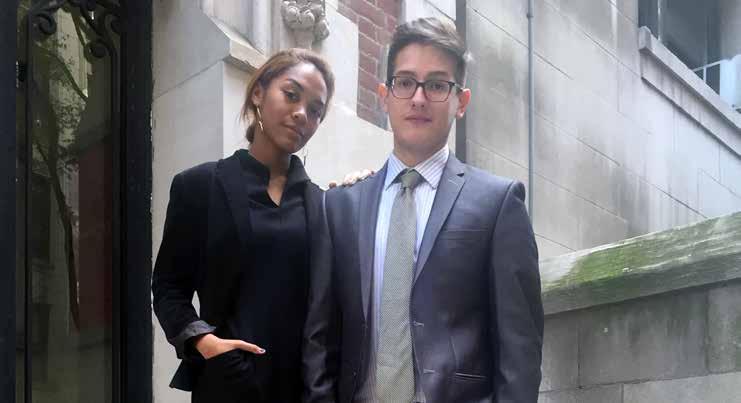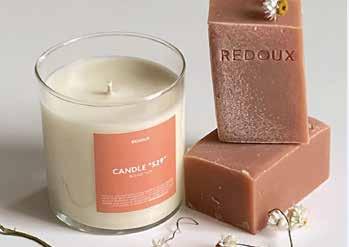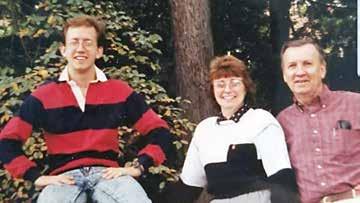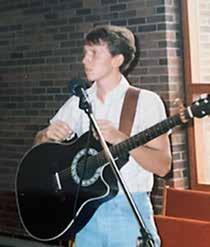
5 minute read
Recent grad to tackle climate change at MIT
Scholar alumni business built from nostalgia taking off
Asia Grant and Alejandro Cuevas began their friendship when they were members of Penn State’s Presidential Leadership Academy. In 2019, the Scholar alumni founded Redoux, a scent and skincare company that aims to put consumers in touch with memories through scent.
Advertisement
The friendship is at the core of Redoux’s main products; its signature scent, “529” was inspired by a visit Cuevas had paid Grant in the summer of 2015, when she was an intern in New York. It was also important to Grant that all products be vegan and environmentally conscious.
“It should just be the basis of how people operate,” she said. “There shouldn’t be anything that’s not clean in your process.”
As 2020 began, Grant was still working a full-time job and Cuevas was continuing doctoral studies at Carnegie Mellon University. They were forming partnerships and doing small craft fairs and were focused on building in-person experiences. The COVID-19 pandemic took a toll on that strategy, but during the summer, Redoux was featured in Vogue magazine in a story about Black-owned businesses. More media coverage followed, and things began to move quickly. The company was also featured on a Facebook Live #BuyBlack Friday Show.
“We went from selling one bar of soap a day to selling 60 bars of soap a day,” said Grant, who wrote her honors thesis about the cosmetics industry. “We had a bunch of stores reaching out to us and saying, ‘We want to stock you.’ This past fall, Redoux was the recipient of a $30,000 grant from Glossier, which helped the company scale its business for the holiday season, boosted its brand recognition, and allowed Grant to make Redoux her full-time job. Nicole Keller, a 2017 Penn State graduate who was also a member of Grant’s Presidential Leadership Academy class, joined the company as partnerships lead.

Grant likes to write out gift notes that accompany the products by hand and saves them to share with her team. Often, they are about a memory the giver shares with the recipient.
“Those are the pieces that are the most rewarding,” Grant said, “because it gives people emotional comfort and gives them a sense of connectivity, both with their past and others.” the future, so that they can relax in their academic pursuits without a concern about this obscure future. I think alumni connections can really paint a picture that’s accurate and authentically shows how many paths will be just fine. You’re at the right place, the right time, you’re at Schreyer. Students, especially honors students, will be able to take a lot of these conversations and distill them into something that aligns with their emerging raison d’être. That’s a big one. I think another student benefit is possible connections for their careers; not necessarily directly, but those career advice conversations can be really big. Now, it is a two-way street, and I think alumni love and derive a lot of fulfillment from hearing from today’s students and I think they can also learn a lot about this present generation. For example, students that are currently undergraduates are much more motivated by purpose than career. Not necessarily, ‘Am I a doctor or lawyer or chemical engineer?’ but rather, ‘What is needed in the world? I’ll do that.’ I think alumni hearing that probably brings them a lot of joy, brings them a lot of vision for their own future, and giving back in some form or fashion through scholarships or opportunities or even just relationships. SM: How can the Schreyer Honors College attract and retain a diverse student population and at the same time, increase cultural competence for all Scholars? PM: This area will be a high priority for me. It’s something that I’ve worked on a lot the past five or six years in other roles. I think the operative word was ‘how.’ For bringing students to Schreyer, the key is outreach early and strategically. And by outreach, I mean getting the word out, either locally, maybe through feeder schools in the Commonwealth, and in the region, about what honors education is, what opportunities there are for independent and interdisciplinary work, and what, in the language of an eighth grader, the possibilities are of making a place like Penn State small, deep, and effective for them and a sense of identity that yes, an eighth-grader at perhaps an inner-city school that this could be a place where you could be really happy and really thrive. I think that’s best done by experiences and not by words. And so, I think designing experiences for middle-schoolers will be key in strategic and in partnerships with admissions. SM: What in your opinion are some of the current challenges facing honors education and higher education in general? PM: I will start with higher education in general. There are a few significant challenges facing all universities and paramount among them is that costs continue to rise at an unsustainable rate, rendering a college education inaccessible for a large portion of the population. Further, there are demographic shifts in graduating high school students that will require universities to be more creative and entrepreneurial than ever in building each incoming class, particularly those in the northeast. Honors education, now more than ever, can help comparatively affordable institutions recruit students who show outstanding potential for academic growth and impact on the institution and — in the future — in the workplace and communities. A challenge for honors education at a place like Schreyer Honors College — arguably the best in its class — is to offer opportunities to exceptionally talented minds that are simultaneously broad in their reach across many disciplines and individualized to resonate with the passions and emerging values of each student. In many ways, an honors college is horizontal in structure — spanning disciplinary colleges — and our challenge is to provide a home-like community to a group of students with a wide range of interests. Schreyer has excelled at that and it can continue to improve.


SM: What are some of your personal interests and/or hobbies?
PM: I love music and enjoy writing and recording songs in a small home studio, having played guitar pretty much my whole life. (Back in high school, Penn State was my second choice after Guitar Institute of Technology … fortunately my dad nudged me in the right direction and I never looked back.) My wife, Tara, and I love cycling and running and you can often catch us out on the roads cycling with friends and catching great views in central PA. SM: What is your favorite Creamery ice cream flavor? PM: Ah, that’s easy: Peachy Paterno!
(top) Mather with his parents, Patricia and James, at the Nittany Lion Shrine in 1988. (bottom) Mather honed his guitar skills while at Penn State Make a gift to the Emergency Fund to support Scholars with unexpected need at raise.psu.edu/SchreyerEmergency 17








